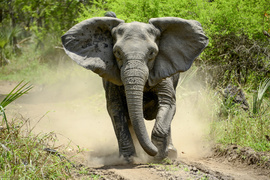Elephants have evolved to be tuskless in response to tusk poaching, study finds.
Researchers in Mozambique found a dramatic shift within 15-years, illustrating how human activity can accelerate genetic changes in other species.
By The Associated Press
A hefty set of tusks is usually an advantage for elephants, allowing them to dig for water, strip bark for food and joust with other elephants. But during episodes of intense ivory poaching, those big incisors become a liability.
Now researchers have pinpointed how years of civil war and poaching in Mozambique have led to a greater proportion of elephants that will never develop tusks.
Slaughtered for their ivory to finance war.
During the conflict from 1977 to 1992, fighters on both sides slaughtered elephants for ivory to finance war efforts. In the region that’s now Gorongosa National Park, around ninety percent of the elephants were killed.
The survivors were likely to share a key characteristic: half the females were naturally tuskless — they simply never developed tusks — while before the war, less than a fifth lacked tusks.
Like eye color in humans, genes are responsible for whether elephants inherit tusks from their parents. Although tusklessness was once rare in African savannah elephants, it's become more common — like a rare eye color becoming widespread.
After the war, those tuskless surviving females passed on their genes with expected, as well as surprising, results. About half their daughters were tuskless. More perplexing, two-thirds of their offspring were female.
The years of unrest “changed the trajectory of evolution in that population,” said evolutionary biologist Shane Campbell-Staton, based at Princeton University.
With colleagues, he set out to understand how the pressure of the ivory trade had tipped the scale of natural selection. Their findings were published Thursday in the journal Science.
Researchers in Mozambique, including biologists Dominique Goncalves and Joyce Poole, observed the national park’s roughly 800 elephants over several years to create a catalogue of mothers and offspring.
“Female calves stay by their mothers, and so do males up to a certain age,” said Poole, who is scientific director and co-founder of the nonprofit ElephantVoices.
Poole had previously seen other cases of elephant populations with a disproportionately large number of tuskless females after intense poaching, including in Uganda, Tanzania and Kenya. “I’ve been puzzling over why it’s the females who are tuskless for a very long time,” said Poole, who is a co-author of the study.
In Gorongosa, the team collected blood samples from seven tusked and eleven tuskless female elephants, then analyzed their DNA for differences.
Humans hit the accelerator on evolution.
Most people think of evolution as something that proceeds slowly, but humans can hit the accelerator.
“When we think about natural selection, we think about it happening over hundreds, or thousands, of years,” said Samuel Wasser, a conservation biologist at the University of Washington, who was not involved in the research. “The fact that this dramatic selection for tusklessness happened over 15 years is one of the most astonishing findings.”
Now the scientists are studying what more tuskless elephants means for the species and its savannah environment. Their preliminary analysis of fecal samples suggests the Gorongosa elephants are shifting their diet, without long incisors to peel bark from trees.
"The tuskless females ate mostly grass, whereas the tusked animals ate more legumes and tough woody plants," said Robert Pringle, a co-author and biologist at Princeton University. “These changes will last for at least multiple elephant generations.”



Enjoy being online again!
Welcome to the community of good people who base their values on evidence and appreciate civil discourse - the social network you will enjoy.Create your free account
Enjoy being online again!
Welcome to the community of good people who base their values on evidence and appreciate civil discourse - the social network you will enjoy.Create your free account
Share this post
Categories
Agnostic does not evaluate or guarantee the accuracy of any content. Read full disclaimer.






